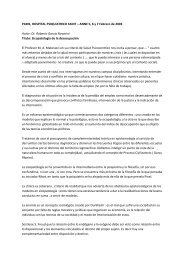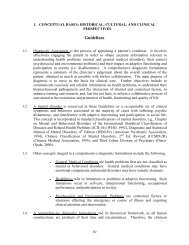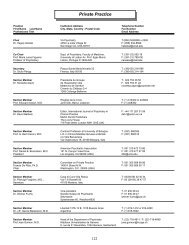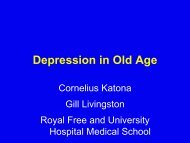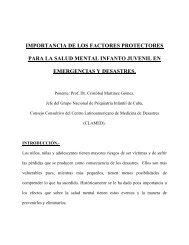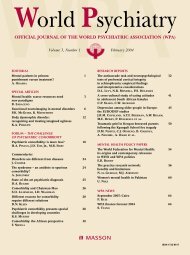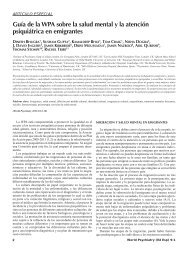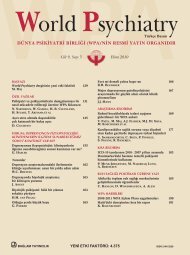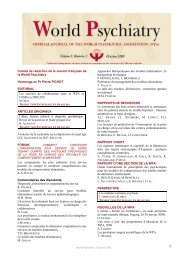ABSTRACTS - World Psychiatric Association
ABSTRACTS - World Psychiatric Association
ABSTRACTS - World Psychiatric Association
You also want an ePaper? Increase the reach of your titles
YUMPU automatically turns print PDFs into web optimized ePapers that Google loves.
model requires a conceptual shift from current assessment and treatment<br />
planning strategies. It is based on repeated assessments, individualized<br />
plans and attention to subclinical symptoms.<br />
RS23.2.<br />
THE COGNITIVE BEHAVIORAL ANALYSIS SYSTEM<br />
OF PSYCHOTHERAPY AS A NEW PSYCHOLOGICAL<br />
TREATMENT STRATEGY FOR CHRONIC<br />
DEPRESSION<br />
E. Schramm<br />
Department of Psychiatry and Psychotherapy, University<br />
of Freiburg, Germany<br />
Chronic depression accounts for roughly a third of all mood disorders.<br />
It is a particularly disabling disorder, which is associated with<br />
greater comorbidity and suicidality, more significant impairments in<br />
functioning, and increased health care utilization than acute major<br />
depressive episodes. In the past, chronic depression was often considered<br />
treatment resistant. Relatively few psychotherapy studies<br />
have focused on chronic forms of depression. In chronic major<br />
depression, a specific form of psychotherapy, the cognitive behavioral<br />
analysis system of psychotherapy (CBASP), proved to be as effective<br />
as medication. The combination of CBASP and medication revealed<br />
significant superiority over both monotherapies. CBASP integrates<br />
behavioral, cognitive, and interpersonal strategies. It focuses on problems<br />
resulting from an inhibition of maturation in early childhood by<br />
using the therapeutic relationship in a personal, disciplined way. In<br />
addition, other interpersonal strategies are used to overcome preoperational<br />
thinking. By means of a specific behavioral technique, the<br />
situation analysis, patients learn to focus on the consequences of<br />
their behaviour and to use efficient social problem-solving.<br />
RS23.3.<br />
CHILDHOOD TRAUMA AS A RISK FACTOR<br />
FOR CHRONICITY OF DEPRESSION<br />
J. Wiersma<br />
Department of Psychiatry and Institute for Research<br />
in Extramural Medicine, VU University, Amsterdam,<br />
The Netherlands<br />
Childhood trauma is linked to adult depression and might lead to a<br />
more chronic course of depression. In this study (n=1230) data from<br />
the Netherlands Study of Depression and Anxiety (NESDA) have<br />
been used to investigate the relationship between childhood trauma<br />
(emotional neglect, psychological abuse, physical abuse and sexual<br />
abuse), early life events (parental loss, divorce of parents, separation<br />
and regularly run away from home), and chronicity of depression.<br />
Results show that chronicity of depression was associated with a significantly<br />
higher prevalence of emotional neglect, psychological<br />
abuse, physical abuse, and sexual abuse. No associations were found<br />
between early life events and chronicity of depression. The strongest<br />
association was found for those who experienced a great number of<br />
severe childhood traumas and chronic depression. After controlling<br />
for comorbid anxiety, severity of depression and age of onset, the<br />
association still existed. These results suggest that number and severity<br />
of childhood traumas play an important role as a risk factor for a<br />
chronic course of depression. For the treatment of depressed patients,<br />
it is therefore important to detect the presence of childhood trauma,<br />
since it may indicate a more chronic course.<br />
RS23.4.<br />
THE SPECIFIC PSYCHOPATHOLOGY OF CHRONIC<br />
DEPRESSION<br />
E.-L. Brakemeier<br />
Department of Psychiatry and Psychotherapy, Charité-<br />
Universitätsmedizin Berlin, Campus Benjamin Franklin, Berlin,<br />
Germany<br />
By conceptualizing cognitive behavioral analysis system of psychotherapy<br />
(CBASP), McCullough proposed that chronically depressed<br />
patients have a primitive representational worldview, not addressed<br />
adequately in most contemporary therapy programs. Thus, psychotherapists<br />
are likely to overestimate the capabilities for change of their<br />
chronically depressed patients. McCullough pointed out that the essential<br />
problem of the disorder involves an age-inappropriate cognitiveemotional<br />
approach to reality that prevents the patient from recognizing<br />
his connection with environment. CBASP is based on two hypotheses<br />
concerning the specific psychopathology of chronic depression: a)<br />
patients are unaware that their primitive verbal thoughts/behaviour<br />
patterns keeps them perceptually disconnected from the environment;<br />
b) chronic depression is a developmental disorder leading patients to<br />
“preoperational thinking”. This means that: a) they think in a prelogical<br />
and precausal manner; b) their behaviors are not influenced by logical<br />
reasoning or reality-based feedback; c) they are characterized by<br />
pervasive egocentricity; d) they use language in a monologue fashion;<br />
e) they are unable to generate true empathy; f) they show emotional<br />
deregulation under stress. Regarding the first hypothesis, a theoretical<br />
learning model and videotapes from therapy sessions try to demonstrate<br />
the proposed perceptional disconnection of chronically<br />
depressed patients. Concerning the second hypothesis, recent trials<br />
with different approaches to operationalize the six dimensions of the<br />
“preoperational thinking” are presented.<br />
RS24.<br />
IS CYCLOTHYMIA THE MOST COMMON AFFECTIVE<br />
PHENOTYPE<br />
RS24.1.<br />
THE EPIDEMIOLOGY OF CYCLOTHYMIC<br />
TEMPERAMENT IN THE GENERAL POPULATION:<br />
RELATIONSHIP WITH SUICIDALITY<br />
E.G. Karam, M.M. Salamoun, Z. Mneimneh, J. Fayyad,<br />
A.N. Karam, J. Yeretzian<br />
Department of Psychiatry and Clinical Psychology, Faculty<br />
of Medicine, Balamand University, Beirut, Lebanon<br />
Temperament is the theoretical mediation between environment and<br />
mental health disorders. The Temperament Evaluation of Memphis,<br />
Pisa, Paris and San Diego Autoquestionnaire (TEMPS-A) has been<br />
translated and validated in several languages, and used in different<br />
subgroups (e.g., clinical, students, company, employees and people<br />
with different educational levels). Lebanon is the only country that<br />
has validated the TEMPS-A in a national cohort, as part of the<br />
Lebanese Evaluation of the Burden of Ailments and Needs Of the<br />
Nation (LEBANON). A total of 1334 respondents (47% of the total<br />
national sample) were selected from the specific study for the assessment<br />
of temperament, namely the LEBANON-TEMP; of these, nine<br />
respondents refused to take the TEMPS-A and five had incomplete<br />
questionnaires, reducing the sample to 1320. In our sample, 6.2% of<br />
the respondents had z-scores above +2 standard deviations on the irritable<br />
temperament, 4.6% on the anxious, 4.4% on the cyclothymic,<br />
54 <strong>World</strong> Psychiatry 8:S1 - February 2009




